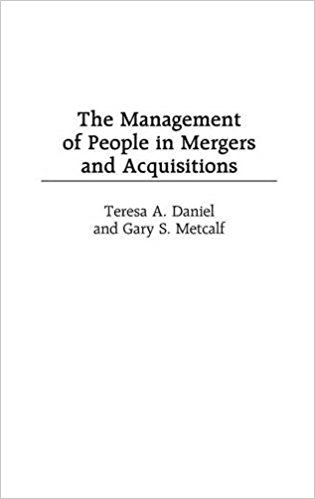
The Management of People in Mergers and Acquisitions
Authors: Theresa A. Daniel, Gary Metcalf
Year: 2001
Month: May
Publisher: Praeger
ISBN: 978-1567203691
Financials alone don’t make an M&A deal work. Equally important is what’s behind them–an organization’s people. How to understand this reality and benefit from it is the thrust of this unusually comprehensive, practical, readable, but conceptually rigorous book. Daniel and Metcalf see HR executives as change agents during the delicate maneuverings before a deal is done, and then after, when it’s time to tackle the fine-grained problems of integrating disparate corporate cultures and the people who vitalize them. They examine the recent and ongoing waves of mergers and acquisitions across industries, setting them in the broader context of organizational change. With concepts, theory, and real-life examples drawn from their long, impressive experience as consultants and executives, Daniel and Metcalf provide step-by-step guidance through the stages common to all corporate combinations. They define and explain the roles to be played in the process by HR professionals and executives elsewhere in the organization, and show how, by interacting productively with each other, they will thus maximize the total contribution to the success of any corporate transaction.
Table of Contents
Why Merge if Most Deals Fail?
Some History on Recent Deal Making
Some Reasons for Failure
The Human Side of the Equation
So Why Merge if So Many Deals Fail?
Structure Function and Purpose of Organizations
Human Knowledge and Value
What Is an Organization
Human Assets
The Role of Human Resources in MA Strategy and Execution
Planning Preacquisition Strategy
Due Diligence
The Legal Minefield
Retirement Liabilities
Negotiations
Leadership
Organizational Culture
Developmental Phases
Defining the Culture
Combining Cultures
Human Capital
A Conceptual Model
How the Organization Uses knowledge
products and Services
Measurement and Regulation
Summary and Discussion
The MA Process
identifying Target or Candidate Companies
Narrowing the Field of Choices
Conducting Preliminary Discussions
Signing a Letter of Intent
Signing the Definitive Agreement
Integration of the Companies
Strategy
Establishment of the Company’s Vision
Integration Goals and Timetables for Results
Organizational Structure
Headquarters Location and Physical Layout
New Name and Legal Structure
Processes Policies and Procedures
Key HR Policies
Consolidation and Reduction of Headquarters Staff
Recruit Top Talent and Employees
Technical Skills and Change Management Training
Roles Responsibilities and Expectations
Employee Customer Attitude Surveys
Issues and Project Plans
The 100Day Path and Results
Appointment of integration Leader
Transition Teams
Summary
People
Employee Selection Process
Retention Tools
Emotional Reactions
The Neutral Zone
Treat the Past with Respect
Historical Views of Leadership
Change Leaders
Leadership in MA Transactions
Employee Communications
Implementation Strategies and Schedule
Other Strategies for Future Consideration
Conclusions
Legal Issues
Voluntary Reductions
Involuntary Reductions
Other Issues to Consider
Suggestions for Action Following the Downsizing
Dealing with Employee Benefits in Mergers and Acquisitions
Techniques for Dealing with Target Company Plans
Other Considerations
Conclusions
Compensation Alternatives Linking Pay to the New Business Strategy
Pay System Alternatives
Profit Sharing and Bonus Programs
Executive Compensation
Alternatives to Compensation
Methods to Measure HR Success
Efficiency Metrics
Return on Investment Metrics
Why Some Mergers Succeed And How Yours Can Too
Some Stories of Mergers and Acquisitions
Petroco
Summary and Analysis
HR Due Diligence Issues Guide
Post-deal Integration Checklist
Model 100Day Strategic Plan
Employee Communications Implementation Plan
Key Post-Merger Employee Messages
Sample Employee Survey Questions
Workforce Reduction Considerations
Guidelines for Handling Employee Termination Meetings
Checklist of Potential Legal Pitfalls in Workforce Reductions
Selected Bibliography
Index
Copyright
